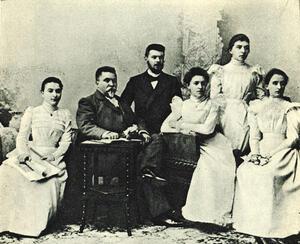NY Times hails Carnegie Hall performance by Rosina and Josef Lhévinne
Critics hailed Rosina and Josef Lhévinne's two-piano recital, held at Carnegie Hall on January 14, 1939, for its "remarkable precision, subtle tinting, and the most carefully perfected detail." The concert by the husband-and-wife team marked both their 40th wedding anniversary and the 40th anniversary of their musical collaboration. The audience full of "many prominent musicians of the city" paid tribute to their long careers as musicians and teachers.
Born in Kiev on March 29, 1880, Rosina Bessie began her piano studies at age six. At age nine, she entered the Moscow Conservatory, where her classmates included Sergei Rachmaninoff. She met her future husband when her regular teacher became ill and Josef, five years older than she, filled in. Over the next nine years, she perfected her piano technique, graduating in 1898 with the school's gold medal.
The Lhévinnes were married after Rosina's graduation. Rosina then abandoned her fledging solo performance career in order to keep her husband, already an accomplished pianist and teacher, in the spotlight. However, she did not abandon the performance circuit altogether, often playing two-piano concerts with her husband. The Lhévinnes toured the U.S. together for the first time in 1907, and moved permanently to New York immediately after World War I. In 1924, they joined the faculty of the newly established Juilliard Graduate School, where they shared a studio. In addition to teaching, they gave regular concerts together in New York and around the country. They met with both popular and critical acclaim, with one critic calling their playing "brilliant, resourceful, and poetic."
After Josef Lhévinne's death in 1944, Rosina continued to teach at Juilliard, where her students included such promising musicians as Van Cliburn, David Bar-Ilan, James Levine, and Arthur Gold. As her students made their mark in national and international piano competitions, Lhévinne's fame grew. However, it was only in 1956, at the age of 76, that Lhévinne resumed her own solo piano career. Her first concert was with the Aspen Festival Orchestra; she went on to perform with orchestras around the country. In 1963, she appeared in four performances with the New York Philharmonic, under Leonard Bernstein's direction.
Despite a busy performance schedule, Lhévinne continued to teach at Juilliard until she passed her 96th birthday. After her death in November, 1976, Juilliard president Peter Mennin called her "quite simply one of the greatest teachers of this century."
Sources: Jewish Women in America: An Historical Encyclopedia, pp. 845-847; Robert K. Wallace, A Century of Music-Making: The Lives of Josef and Rosina Lhévinne (Bloomington, 1976); New York Times, November 8, 1936, January 8, 1939, January 15, 1939.




Truly a (((GREAT))) Teacher & 🎹PIANIST!🎹👏👏👏